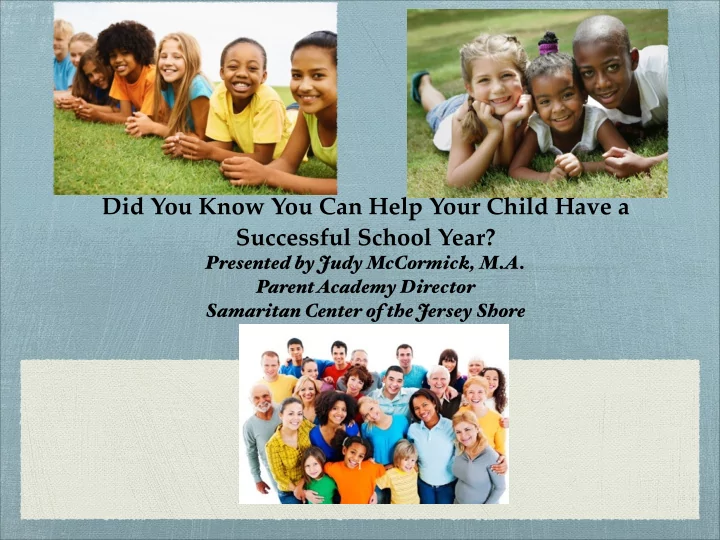

Did You Know You Can Help Your Child Have a Successful School Year? Presented by Judy McCormick, M.A. � Parent Academy Director � Samaritan Center of the Jersey Shore � 1
Goals for this workshop 1. Make parents aware of the many meanings of successful. � 2. Encourage parents to help their child be successful in many different areas. � 3. Teach parents the importance of being involved in their child’s education � 4. Discuss the need for tolerance among all levels of students. � 5. Remind parents that communication is the key to understanding your child. � 6. Give parents the opportunity to ask questions to better understand their child. � 2
What is Successful??? • Is it being successful academica lm y? � • Is it being successful socia lm y? � � 3 • Is it being successful emotiona lm y and behaviora lm y?
Successful is all of these!!!! Academic Success � Social Success � Emotional/Behavioral Success � True success is measured when all of the above work together! � 4
Academic Success • Think Long Term � • Have the Right Attitude � • Communicate with all educators � • Stick to Routines - fine tune the morning routine, homework routine, nighttime routine � � 5 • Support Strengths
More Tips • Be a Reading and Writing Role Model � • Demonstrate Relevance of Learning � • Support Independence - especially in homework � • Teach Self-Reliance - chores are helpful in this area � • Encourage Active Learning - asking questions and problem solving � • Develop a Partnership - Parent and Teacher need � 6 to be a team
Just a few more… • Create healthy habits at home - sleep, nutrition � • Create a “Launch Pad” at home � • Designate a space for homework � • Look for ways to teach your child everyday � • Talk about their learning often � � 7 • Expect Success
Social Success “If we increase social skills, we see commensurate increases in academic learning” � Stephen Elliot, Vanderbilt University � 8
Top Ten Social Skills 1. Listen to others � 2. Follow the steps � 3. Follow the rules � 4. Ignore distractions � 5. Ask for help � 6. Take turns when you talk � 7. Get along with others � 8. Stay calm with others � 9. Be responsible for your behavior � � 9 10.Do nice things for others
The Need For Tolerance Be a role - model for your child. Ask your child about social - aggression. Be aware that your child might be a target, a bully or a traumatized bystander. Teach your child how to be an “upstander”. Encourage them not to gossip and spread rumors and lies. Monitor their social media to determine what they are doing. Teach tolerance in all areas including � 10 race,culture,religion, gender, body - type, and intelligence.
More About Tolerance Help them find friends that have a similar sense of humor, not putting others down and making fun of others who are not like them. Teach them to be open and honest with their friends to help build a support group. If your child sees or hears someone being bullied encourage them to share this with the school counselor. � 11 Reporting an incident to those in charge is their responsibility
� 12
Emotional and Behavioral Success � A child’s EQ is as important as their IQ • Identifying and regulating one’s emotions and behaviors � • Thinking of appropriate solutions to conflict � • Able to engage in social conversations and cooperative play � • Correctly interpreting other’s behaviors and emotions � • Feeling good about oneself and others � 13
Four Aspects of School Climate � Susan Blaney- author and speaker Empathy - feeling cared for and caring for others and understanding their feelings � Respect - considerate behavior toward all � Accountability - sense of follow-through at school and at home � � 14 Trust - belief in others
You need to be an advocate • Know how your child is doing � • Help your child prepare for learning � • Get special services if your child needs them � • Get homework or tutoring help if needed � • Ask questions and see what you can do � • Let the school know any concerns you have � 15
School Counselors Can Help � If your child finds themselves falling behind reach out to the counselor. Talking directly with the school counselor helps with any challenges your child might be experiencing whether personal or school- related. School counselors specialize in providing resources and assisting students with a variety of needs. Amy Young, 732-528-8810 ext. 2013 Nancy Sanders, 732-528-8810 ext. 2014 � � 16
Support Learning at Home • Demonstrate a positive attitude about education � • Monitor your child’s electronic use including TV, computer, video games and cell phones � • Encourage reading- first, they learn to read then they read to learn for the rest of their lives � • Teach following directions and listening � • Encourage your child to use the library � 17
Support Your Child By Being There Meet your child’s teacher � Get to know who’s who in your child’s school � Attend parent-teacher conferences � Learn what the school offers � Volunteer at the school � 18
Remember… Communication is the key to understanding and expanding your child’s learning. � 19
Time for questions and comments Judy McCormick - Parent Academy Director � Samaritan Center at the Jersey Shore � 732-223-HOPE (4673) � judy@njsamaritan.org � 20
Recommend
More recommend